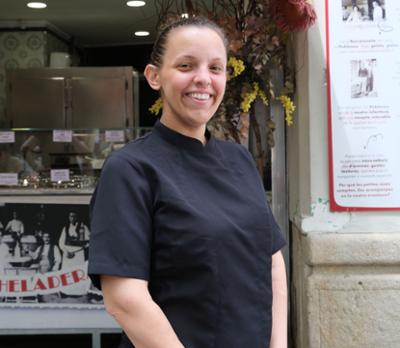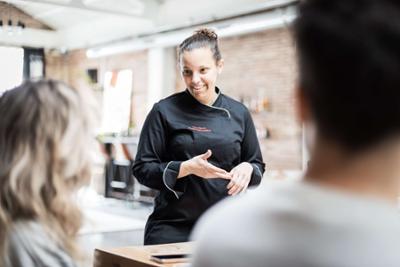

"At Mamá Heladera we have stopped working with suppliers for badmouthing us (for being women)"

To combat female invisibility in the sector, Irene Iborra thinks that women should be given more of a voice.
Irene Iborra is the fifth generation of Tío Che, an emblematic horchatería and ice cream parlour in Barcelona's Poblenou neighbourhood. In 2021, she opened Mamá Heladera, where she gives customers the chance to relive their childhood memories through ice cream.
The chef recognises that it is not easy for a woman to do this job because of the heavy lifting and the family reconciliation, but she proves that it is possible not only to work as an ice cream maker, but also to have prestige. This chef has even become the protagonist of a children's story, La Cucurutxu.
Interview for female personalities in the sector SECTION with Irene Iborra, owner of Mamá Heladera
1.- How has the role of women in the ice cream industry evolved over the last 10 years?
Ten years ago I didn't know any outstanding women ice cream makers. Nowadays, women are emerging and are already leaders in their specialities. Many of them are still in the background.
2.- What are the challenges facing women in the sector?
Personally, it was difficult for me to work in the bakery. My father used to say that everything was heavy, that the machines were complicated, that I could hurt myself.... And it is true that, at the beginning, as I came from an office, it was difficult for me to lift up to 15 litres, but everything can be trained. Machines can be learned and if we hurt ourselves, we can heal.
Reconciling family life is also complicated. I have a little girl and in the summer I have to be in the shop all day. Now it's easier, but when I was breastfeeding her it was a very hard time in terms of time management.
Generally speaking, in many segments of the population, society is changing, but in others time is lacking.
3.- Do you think there are equal opportunities (salaries, positions of responsibility, recognition...) for women and men?
Work is being done, I see it in the specialised media that give more visibility to women.
I haven't seen statistics, so I can't answer externally about salaries and positions.
4.- Do you think that there is little presence of women in ice cream congresses and events, and in competitions? What actions could be taken to combat the invisibility of women?
There is still less presence of women. I love to see Natalia Ramírez appearing at ice cream events, it gives me the strength to give a voice to my work.
Until recently the ice cream world was very closed, only the most popular ones were known. Now there are more ways to make yourself known and enter these circles. Access to events should be made easier.
5.- What percentage of women are there in Mamá Heladera? Are there specific positions for women or men?
At Mamá Heladera we are a female team, we work with two women, Irene Vidal and myself, and this summer Rita Viñolas has been with us.
6.- What recommendations would you give to students who want to dedicate themselves to this profession?
That they go for it, that they acquire a good base, that they have motivation, that they try many times, that they make mistakes, that they keep trying and when something turns out well, that they show it to the world proudly, that they celebrate everything and that they enjoy every stage they go through.
7.- Have you experienced any discrimination in your profession because you are a woman?
Some refrigeration technicians who didn't know me even asked me if I knew what a compressor was. Some salesperson has advised me to ask my husband -now ex-husband- to make the decision and I have had to clarify that I make the decisions myself, that there is nothing to consult. At first, a fellow ice-cream maker told me that my idea would not work and sometimes I wonder if he would think the same way if I were a man. Nowadays, when I carry some weight, I hear comments like "you're so heavy..." and yet, if a haulier is carrying the same weight, nothing is said to him.
On a day-to-day basis, the working atmosphere is wonderful and we don't let our women's company suffer any discrimination. We have stopped working with suppliers for badmouthing us, we have put limits on customers and we will do whatever it takes to keep the business as it is.





